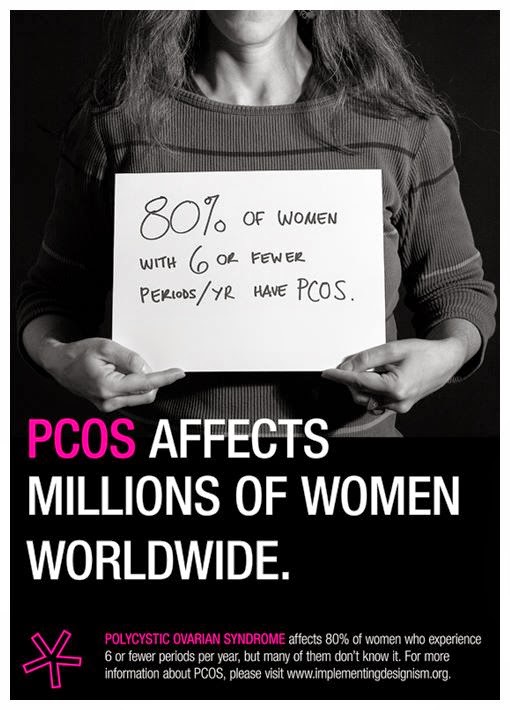PCOS and Diabetes... The Rise of an Epidemic!
Author: Ashley Levinson
Twitter: @pcosgurl
December 2, 2014
Many are unaware of what
PCOS or Polycystic Ovary Syndrome is, let alone it is one of the biggest contributing causes to Diabetes today!
PCOS or Polycystic Ovary Syndrome is an endocrine disorder affecting between 10-20% of women worldwide with less than half knowing they are living with it. Many associate PCOS as a gynecological issue as many manifestations affect a woman's menstruation, ovulation and fertility. PCOS, while it is the leading cause of infertility is however a metabolic syndrome affecting multiple systems in the body.
Even though #PCOS was first recognized over 75 years ago, we are no closer to understanding its cause or its treatment. There is no singular test that can conclude whether a woman or girl has the syndrome instead it is a collection of symptoms, history and diagnostic testing. As a result once a doctor concludes it is Polycystic Ovary Syndrome, they manage the symptoms to prevent long-term health consequences such as infertility, diabetes and heart disease.
One of key factors of this syndrome with it's metabolic complications is often the overproduction of insulin and the imbalance of blood glucose which in turn leads to insulin resistance, pre-diabetes and ultimately Diabetes Mellitus II. Polycystic ovary syndrome (PCOS) and Type 2 diabetes mellitus (T2D) are both obesity-related conditions that share epidemiological and pathophysiological factors. Research has indicated between 50% and 70% of American women with
Polycystic Ovarian Syndrome experience Insulin Resistance. This means the
body has become somewhat resistant to responding to insulin. As
a result, women with the syndrome have an overproduction of androgens (Male
Hormones in the Female Body) which in turn affect several body systems and
result in symptoms not limited to; acne, weight –gain and obesity, excess
facial and body hair, thinning and balding hairline, irregular and/or absent
menses and infertility. Estimates of prevalence of metabolic syndrome in women with PCOS are between 34 and 46%, using the National Cholesterol Education Program Adult Treatment Panel III (NCEP ATPIII) criteria. It is also clear that hyperandrogenism is frequently associated with T2D in women
Additionally, in a blog from the ADA they state, "Women with type 1 diabetes are at increased risk for PCOS, further suggesting that insulin may be a key player. A possible link between PCOS and type 1 diabetes may be that the large swings in insulin levels that accompany insulin injections may place extra stress on the ovaries. Likewise for people with type 2, who tend to have high levels of insulin in the early stages of diabetes because their bodies whip it out to fight their insulin resistance."
PCOS carries a substantial risk of developing type 2 diabetes and is a risk factor for CVD. These are collectively referred to as CMD. Several studies from the USA report 7.5–10% of women with PCOS have type 2 diabetes and 31–35% with IGT. Furthermore, numbers of women with PCOS appear to be increasing. A link has been reported between the increasing incidence of obesity, IGT and type 2 diabetes amongst adolescent girls with PCOS which means diabetes could reach epidemic proportions among young women predisposed to T2D and insulin resistance.
PCOS carries a substantial risk of developing type 2 diabetes and is a risk factor for CVD. These are collectively referred to as CMD. Several studies from the USA report 7.5–10% of women with PCOS have type 2 diabetes and 31–35% with IGT. Furthermore, numbers of women with PCOS appear to be increasing. A link has been reported between the increasing incidence of obesity, IGT and type 2 diabetes amongst adolescent girls with PCOS which means diabetes could reach epidemic proportions among young women predisposed to T2D and insulin resistance.
Screening women with PCOS for diabetes is seldom undertaken, largely through difficulties in diagnosis due to identification and management of PCOS continuing to focus on treatment of infertility and hirsutism. There is a need for evidence-based guidelines on screening, diagnosis and interventions to reduce CMD specifically in women with PCOS.
With more than half of the women with PCOS predestined to have prediabetes or type 2 diabetes before the age of 40, finding ways to diagnose, screen and educate on the connection between these to diseases is imperative! Without the proper education and awareness of these connected disorders, the Diabetes epidemic will continue to rise.
REFERENCES:
- Diabetes Stops Here ADA Blog: http://diabetesstopshere.org/2012/09/11/pcos-the-cousin-of-diabetes/
- Medscape: http://www.medscape.com/viewarticle/759835









